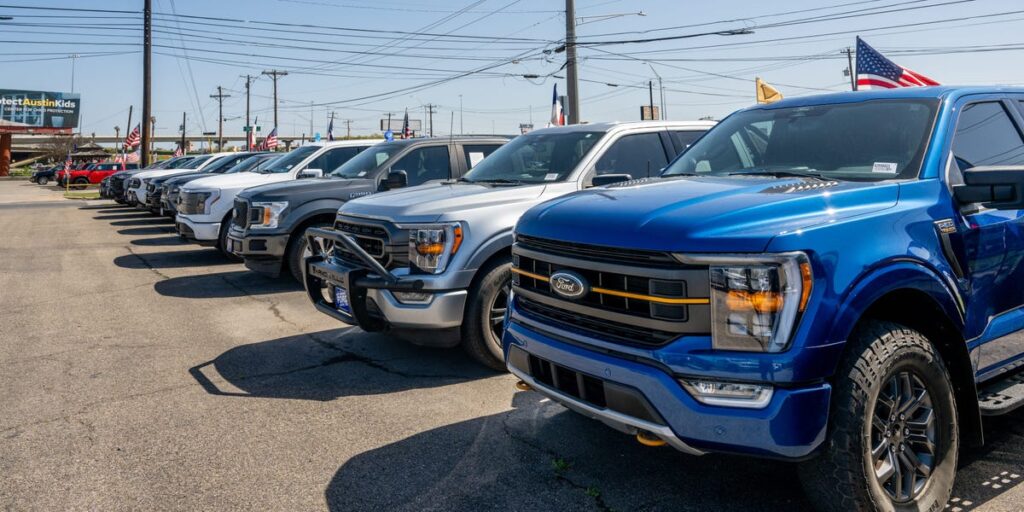President Donald Trump on Wednesday announced 25% tariffs on all imported passenger vehicles and key parts will take effect on April 2.
The move is widely expected to drastically increase the sticker price of cars, trucks, and SUVs by thousands of dollars, sending shares of many automakers lower in trading late Wednesday.
The tariffs affect not just foreign automakers but many domestic nameplates, like GM’s Chevrolet, as well. An Equinox SUV’s transmission may be assembled in the US and shipped to Mexico for final assembly before finally ending up at a lot in Omaha, for example.
Automakers rely on a complex supply chain in which parts and vehicles regularly cross North American borders during the manufacturing process or before they hit dealer lots, thanks to various regional trade agreements inked over the years. The White House said some imported parts that are compliant with the USCMA are exempt.
Government data shows 39 models on sale in the US that are imported from either Canada or Mexico, from both domestic and foreign manufacturers.
Experts predict manufacturing costs will rise anywhere from $4,000 to $12,000, with automakers passing much of that cost on to consumers in the form of higher prices. According to Edmund’s data, new vehicle prices have skyrocketed since 2020 and now average more than $50,000.
Analysts at JPMorgan called the escalated tariffs “draconian” and slashed their outlooks for many automakers.
When it comes to vehicles sold in the US, Ford imports the least, making about 78% of those cars, trucks, and SUVs domestically. Mazda, Volkswagen, and Mercedes-Benz import the most, industry data shows. Electric automakers Tesla and Rivian may be the least affected, analysts estimate.
A trade group representing Ford, GM, and Stellantis said earlier in March the import costs would stymie American competitiveness, increase consumer prices, and decrease investment in US jobs.
Vehicle parts and finished vehicles are the US’ top imports from Mexico and second behind oil from Canada. Prices on other vehicles that rely on imported parts could also see increases, even if their final country of assembly is the US.
Here’s a look at the models imported for sale in the US and where they are manufactured, according to data from the National Highway Traffic Safety Administration as of March 3. Prices on other vehicles that rely on imported parts could also increase.
BMW
- BMW 2-Series Coupe/Convertible (Mexico)
- BMW M2 Coupe (Mexico)
- BMW 3-Series Sedan (Mexico)
42.7% of BMW cars sold in the US are made domestically, according to Edmunds data.
Ford
- Ford Bronco Sport (Mexico)
- Ford Maverick (Mexico)
- Ford Mustang Mach-E (Mexico)
- Ford Mustang GTD (Canada)
78.3% of Ford vehicles sold in the US are made domestically, according to Edmunds data.
General Motors
- Chevrolet Blazer (Mexico)
- Chevrolet Blazer EV (Mexico)
- Chevrolet Equinox (Mexico)
- Chevrolet Equinox EV (Mexico)
- GMC Terrain (Mexico)
47.3% of GM vehicles sold in the US are made domestically, according to Edmunds data.
Honda
- Honda CR-V Hybrid (Canada)
- Honda Civic Sedan (Canada)
- Honda HR-V (Mexico)
- Honda Prologue (Mexico)
- Acurda ADX (Mexico)
58.9% of Honda vehicles sold in the US are made domestically, according to Edmunds data.
Hyundai
Hyundai makes 38.4% of its vehicles vehicles sold in the US are made domestically, according to Edmunds data.
Kia
Kia is owned by Hyundai.
Mazda
20.3% of Mazda vehicles sold in the US are made domestically, according to Edmunds data.
Mercedes-Benz
- Mercedes-Benz GLB (Mexico
36.5% of Mercedes-Benz vehicles sold in the US are made domestically, according to Edmunds data.
Nissan
- Infiniti QX50 (Mexico)
- Infiniti QX55 (Mexico)
- Nissan Sentra (Mexico)
- Nissan Kicks (Mexico)
- Nissan Versa (Mexico)
45.6% of Nissan vehicles sold in the US are made domestically, according to Edmunds data.
Stellantis
- Ram 2500-5500 (Mexico)
- Ram ProMaster (Mexico)
- Jeep Compass (Mexico)
-
Chrysler Pacifica (Canada)
68.2% of Stellantis vehicles sold in the US are made domestically, according to Edmunds data.
Toyota
- Toyota Tacoma (Mexico)
- Toyota RAV4/RAV4 Hybrid (Canada)
- Lexus NX (Canada)
- Lexus RX (Canada)
44.1% of Toyota vehicles sold in the US are made domestically, according to Edmunds data.
Volkswagen Group
- Audi Q5/SQ5 (Mexico)
- VW Jetta (Mexico)
- VW Taos (Mexico)
- VW Tiguan(Mexico)
27.8% of Volkswagen Group vehicles sold in the US are made domestically, according to Edmunds data.

